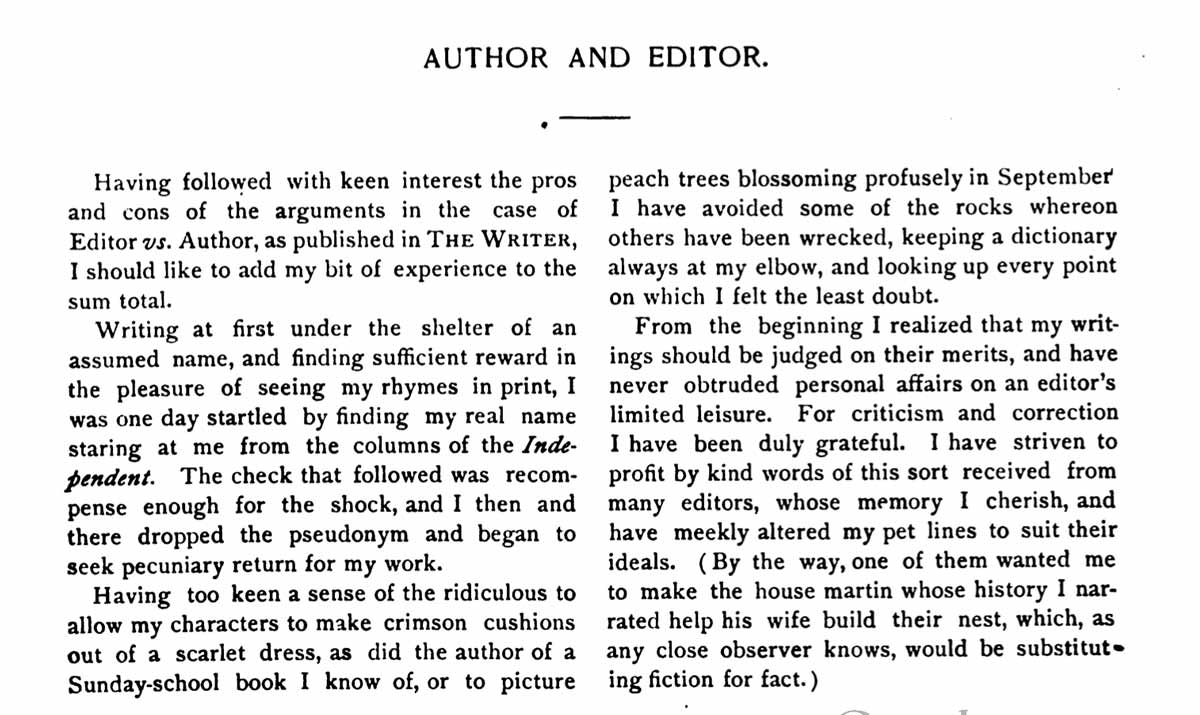I discovered this article by Ella W. Ricker in The Writer: Volume 5 which was published in 1891.
I’ve been working hard on learning as much about this writer as I can and writing her biography and this article actually provided 2 very important pieces of information that helped me learn a lot more about her.
I thoroughly enjoyed this article, no doubt because of my own experience in the professional writing world – but also because it gives us so many more clues into the life and times of Ella W. Ricker.
In this piece, Ella shares her frustrations submitting work to various publishers at the time, which unfortunately is a problem that still exists today.
The only improvement between now and 1891 is that at least the manuscripts can be saved and transmitted digitally, saving not only on postage but ensuring original works would not be prone to disappearing forever due to a publisher’s neglect or issues in postage.
Sadly, we also discover in this article that a good bit of her work was likely lost – perhaps even destroyed before publication – due to an editor rejecting the work.
The problem of rejection is the case for nearly any writer – even very successful modern writers such as J.K. Rowling experienced their work being rejected – J. K. Rowling’s Harry Potter was rejected 12 times!
It saddens me to think of how many wonderful things we may never know existed just because an editor might not like what they wrote. Who are editors to say if a work is good or not?
Here is a copy of the original article – more comments from me afterward. 🙂

Author and Editor
Having followed with keen interest the pros and cons of the arguments in the case of Editor us. Author, as published in THE WRITER, I should like to add my bit of experience to the sum total.
Writing at first under the shelter of an assumed name, and finding sufficient reward in the pleasure of seeing my rhymes in print, I was one day startled by finding my real name staring at me from the columns of The Independent. The check that followed was recompense enough for the shock, and I then and there dropped the pseudonym and began to seek pecuniary return for my work.
Having too keen a sense of the ridiculous to allow my characters to make crimson cushions out of a scarlet dress, as did the author of a Sunday-school book I know of, or to picture peach trees blossoming profusely in September I have avoided some of the rocks whereon others have been wrecked, a keeping a dictionary always at my elbow, and looking up every point on which I felt the least doubt.
From the beginning I realized that my writings should be judged on their merits, and have never obtruded personal affairs on an editor’s limited leisure. For criticism and correction I have been duly grateful.
I have striven to profit by kind words of this sort received from many editors, whose memory I cherish, and have meekly altered my pet lines to suit their ideals. ( By the way, one of them wanted me to make the house martin whose history I narrated help his wife build their nest, which, as any close observer knows, would be substituting fiction for fact.)
Yet, while acknowledging that but for unexpected encouragement and words of cheer from editorial pens I should long ago have been tempted to lay aside the quill entirely for the broom and duster, I have somewhat against the fraternity, for, oh, I have sent them manuscript in large manila envelopes and it has come back to me rolled and tied with a string. I have sent it fair and unmarred, and it has returned tattered and blue-pencilled till much must be rewritten.
Like H. A. Saxton, I have had manuscript accepted and then sent back when the magazine changed hands. In several cases the manuscript has been lost, and only after long and vexatious delay have I learned the fact and felt free to send it elsewhere. Two stories of considerable length have thus disappeared, and though sent with stamps for return, no word of acknowledgment ever reached me. In one case letters of inquiry were left unanswered, and only a personal call elicited the fact. If each editor would acknowledge receipt of manuscripts, many hours of hope deferred would be saved. He should also notify of acceptance.
I once sent an article to an editor who never notified me of the receipt of manuscript, but usually returned it within a month if not available. After watching two years for its appearance, I had the pleasure of receiving it back with the usual polite regrets.
In the ethics of business a man’s word is supposed to be as good as his bond, but some editors appear to rate their agreements as of less value than the contents of their waste baskets.
I sent a story to one of these in accordance with the terms of a prize competition. I was notified shortly afterward that it had not taken a prize, but that the editor would print it at a specified sum per column. This offer I accepted.
Two years later the manuscript came back to me, marred with many interlineations and alterations, with the cool remark that the editor did not like it, but would send me the paper a year if I liked!
Fancy Jordan, Marsh, & Co. returning a cargo of goods purchased abroad, with the message that the taste of their buyer did not now approve their designs, but that they would send the firm’s catalogue in lieu of the cash agreed upon.
I fully endorse Mr. Saxon’s remarks upon “Payment upon Publication.” I have waited ten years now for the appearance of a poem accepted on such terms by one of the Boston magazines.
Of the revision of poems by editors whose poetical faculties are seemingly dormant, I can speak with feeling, for before me lie specimens with rhyme, and rhythm, and poetic expression tortured out of all due proportion by these well-meant improvements.
I wish THE WRITER would some day devote a few pages to specimen verses as originally written and as revised by editors, and let the public judge between them.
As a remedy for the ills we complain of, I would suggest:
First, attention on the part of authors to the suggestions made by their more experienced brethren. Be sure you have a thought to express, and then be careful as to the manner of its expression.
- Study spelling, grammar, rhetoric, and style, as shown in the writings of the best authors. Revise, condense, and copy carefully.
- Keep a copy of each article, and a notebook wherein to record the date it was written, and the history of its journeyings, noting always the periodical to which it was sent and the date of departure and return, with price finally obtained and date of publication.
Second, cooperation on the part of authors, with a resulting list of periodicals, reading something like this:
- Youth’s Companion, weekly, Boston, Mass. Pays on acceptance. Returns manuscripts if unavailable, or notifies of acceptance within a fortnight. Desires poems, stories, anecdotes, sketches of adventure, etc., calculated to interest youth from fifteen years upwards, and also has a children’s page. Excludes love and fairy stories, or anything calculated to stir up sectional strife.
- Christian Mirror, Portland, Me. Religious weekly. Does not pay for unsolicited contributions, but will send the paper a year for a suitable contribution. Has children’s page.
- Blanktown Herald. Weekly family paper. Prints all the good material it can get, but neither pays the author nor sends him a copy of the article when it appears. Carefully deposits unused manuscripts in the wastebasket, and confiscates the stamps enclosed. Never answers letters of inquiry.
No author with a list like this would be likely to waste time and postage stamps on periodicals whose editors are dilatory, unreliable, and unfair to their contributors, and if libel suits are feared, let the black list be like Bradstreet intelligible only to the initiated.
– South Berwick Maine, Ella W. Ricker
So Much to Learn From This!
The first thing we can learn from this article is that we now know that between 1890-1891, Ella W. Ricker was residing in South Berwick, Maine.
This is wonderful information to come across when researching things such as ancestry and genealogy for writing biographies! Knowing this little scrap of info gives a place to research property records, census records, and other details about a person’s life.
The article also suggests that she may have published other works under a pseudonym. Writers often would publish under a pseudonym at the time, especially female writers and authors so that they may be taken more seriously in the literary publishing world. It will probably be very hard to find that pseudonym, but we are still going to try!
Related Research and More to Explore
- The Writer Volume 5, available to read via archive.org – https://archive.org/details/sim_writer_1891-07_5_7
- Ella W. Ricker: The New England Poet the World Forgot, Stein, Chelle, Resalvaged, https://resalvaged.com/ella-w-ricker/, Published April 26, 2022

Have any information to add about Ella W. Ricker or what it was like to be a writer and try to get published in the 1890’s? Share your research below!